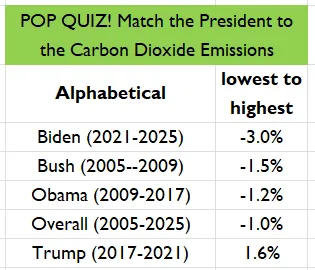Background
The CO2 Coalition is a national organization made up of nearly 70 top scientists bringing honesty to climate science.
This report is based principally on the work of Gregory Wrightstone, geologist, CO2 Coalition Executive Director and Expert Reviewer for the U.N. Intergovernmental Panel on Climate Change; Dr. Patrick J. Michaels, Senior Fellow for the CO2 Coalition and Competitive Enterprise Institute and Past President of the American Association of State Climatologists; and David T. Stevenson, Director, Center for Energy & Environment at the Delaware-based Caesar Rodney Institute and author of more than 100 analytic reports.
The analyses of Mr. Wrightstone and Dr. Michaels were presented June 22 to the Pennsylvania House Environmental Resources & Energy Committee. Mr. Stevenson previously published a peer-reviewed analysis of RGGI for the Cato Institute.
These and other contributors to this evaluation — listed at the end of the document — represent the fields of climatology, meteorology, physics, geology, agronomy and more.
Introduction
Pennsylvania Governor Tom Wolf, on October 3, 2019, signed an Executive Order beginning the process to enroll Pennsylvania into the Regional Greenhouse Gas Initiative (RGGI). RGGI is a mandatory carbon cap and trade program from states in the Northeast.
Electricity generation using coal and natural gas is targeted for reduction by this order and accounts for slightly more than 50% of the Commonwealth’s needs according to the U.S. Energy Information Administration. Pennsylvania is an electricity generation powerhouse in the northeast and exports about one third of its total generation to other states. The increased costs of the electricity generated in Pennsylvania due to imposition of RGGI mandated increases will be borne, not only by our residents, but by those citizens in surrounding states that benefit from our energy exports.
According to the Governor and his executive order, the need for a RGGI-dictated carbon taxation/trading scheme is because the Commonwealth’s carbon dioxide emissions are contributing to dangerous CO2-driven warming.
The 2019 executive order directed the state’s Department of Environmental Protection (DEP) to propose rules by September 15, 2020. The process is moving forward with recent approvals by four of DEP’s advisory bodies, including the Air Quality Technical Advisory Committee, Small Business Compliance Advisory Committee, Citizens Advisory Council and Environmental Justice Board.
Two CO2 Coalition scientists provide herein scientific refutations of Governor Wolf’s justifications for imposing RGGI.
In addition, this document includes a June 2021 analysis by the Caesar Rodney Institute, which addresses the Wolf administration’s flawed economic and environmental arguments for RGGI. Rather than confirming benefits from RGGI, the analysis predicts a great deal of harm for Pennsylvania’s economy.
Download Pennsylvania’s Greenhouse Gas Initiative Relies on Faulty Date


